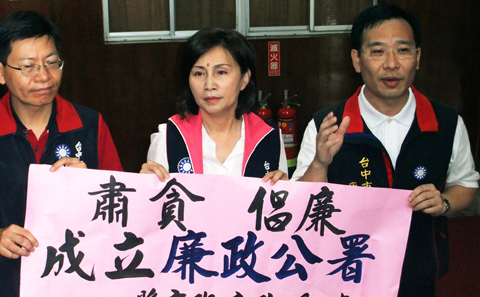Tainan Prison Chief Guard Hsieh Shih-lun (解世倫) will be removed from his position before the end of the week, Deputy Warden Huang Chen-yin (黃珍寅) said yesterday, after evidence emerged of Hsieh’s presence at a crime scene.
“His new position has yet to be decided, but it will definitely be a position where he will not have any contact with inmates,” Huang said.
Hsieh was at the residence of Taichung gangster Lin Yi-hung (林亦宏) at the time he was murdered on Oct. 17.

PHOTO: CNA
After receiving a DVD of the crime from an unidentified source, Democratic Progressive Party Legislator Chiu Yi-ying (邱議瑩) made it public at a press conference on Tuesday.
In the video, Hsieh is seen walking into Lin’s residence about six minutes prior to the crime. Two gunmen suddenly enter Lin’s residence and begin shooting at him. Footage shows Hsieh hiding behind a sofa. After the two gunmen leave, Hsieh checks on Lin and then leaves without calling police or an ambulance.
The warden said that Hsieh admitted that he had befriended Lin when the latter was serving a prison sentence in Tainan 10 years ago.
Meanwhile, Taichung Police yesterday welcomed their new chief inspector and new chief of the Criminal Investigation Corps (CIC) after their predecessors were transferred amid a scandal surrounding alleged close ties between police officers and slain gangster Weng Chi-nan (翁奇楠).
“The chief inspector and the CIC chief had to be replaced to take responsibility in the Weng case,” Taichung Police chief Frank Chiu (邱豐光) said.
The National Police Agency will transfer CIC captain Chang Hsien-yuan (張獻元) to the Changhua County Police Department as a senior counselor, while chief inspector Liang Jen-hui (梁仁輝) will head to the Kinmen County Police Department, where he will be spokesman.
Chang and Liang took responsibility for being at the scene of a crime after the agency on Monday made public video clips from where Weng was shot dead in his office on May 28.

US climber Alex Honnold is to attempt to scale Taipei 101 without a rope and harness in a live Netflix special on Jan. 24, the streaming platform announced on Wednesday. Accounting for the time difference, the two-hour broadcast of Honnold’s climb, called Skyscraper Live, is to air on Jan. 23 in the US, Netflix said in a statement. Honnold, 40, was the first person ever to free solo climb the 900m El Capitan rock formation in Yosemite National Park — a feat that was recorded and later made into the 2018 documentary film Free Solo. Netflix previewed Skyscraper Live in October, after videos

NUMBERS IMBALANCE: More than 4 million Taiwanese have visited China this year, while only about half a million Chinese have visited here Beijing has yet to respond to Taiwan’s requests for negotiation over matters related to the recovery of cross-strait tourism, the Tourism Administration said yesterday. Taiwan’s tourism authority issued the statement after Chinese-language daily the China Times reported yesterday that the government’s policy of banning group tours to China does not stop Taiwanese from visiting the country. As of October, more than 4.2 million had traveled to China this year, exceeding last year. Beijing estimated the number of Taiwanese tourists in China could reach 4.5 million this year. By contrast, only 500,000 Chinese tourists are expected in Taiwan, the report said. The report

Temperatures are forecast to drop steadily as a continental cold air mass moves across Taiwan, with some areas also likely to see heavy rainfall, the Central Weather Administration (CWA) said. From today through early tomorrow, a cold air mass would keep temperatures low across central and northern Taiwan, and the eastern half of Taiwan proper, with isolated brief showers forecast along Keelung’s north coast, Taipei and New Taipei City’s mountainous areas and eastern Taiwan, it said. Lows of 11°C to 15°C are forecast in central and northern Taiwan, Yilan County, and the outlying Kinmen and Lienchiang (Matsu) counties, and 14°C to 17°C

STEERING FAILURE: The first boat of its class is experiencing teething issues as it readies for acceptance by the navy, according to a recent story about rudder failure The Hai Kun (海鯤), the nation’s first locally built submarine, allegedly suffered a total failure of stern hydraulic systems during the second round of sea acceptance trials on June 26, and sailors were forced to manually operate the X-rudder to turn the submarine and return to port, news Web site Mirror Daily reported yesterday. The report said that tugboats following the Hai Kun assisted the submarine in avoiding collisions with other ships due to the X-rudder malfunctioning. At the time of the report, the submarine had completed its trials and was scheduled to begin diving and surfacing tests in shallow areas. The X-rudder,